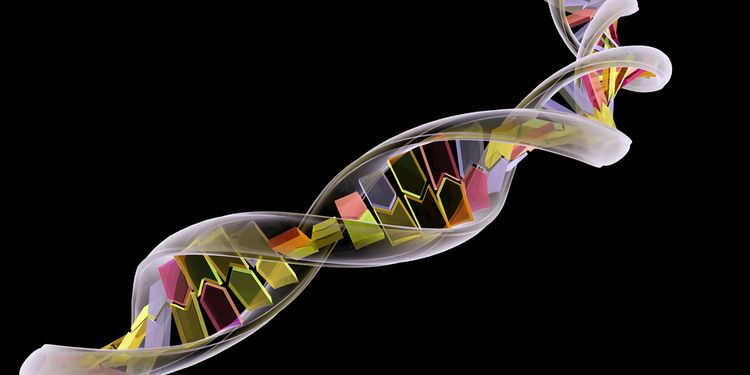What Exactly Is Your MTHFR Gene?

What does “MTHFR” bring to mind for you? A bunch of random letters? The abbreviation for a common curse word? If you’ve found this article, you’re probably wondering if you’re affected by an MTHFR gene mutation, and what to do about it.
Your doctor may have mentioned MTHFR to you in passing, or even presented a beyond-complicated explanation of how this gene impacts your overall health, and you’re looking for answers. Don’t worry. By the end of this article, you’ll understand the MTHFR gene way better, which is good—because it’s actually really important.
However, you probably won’t learn to say MTHFR’s full name—which, by the way, is methylenetetrahydrofolate reductase. Aren’t you glad it’s abbreviated?
Like its long name, the MTHFR gene – and its associated mutations – is pretty complex. There’s still a lot of research being done about it, but what’s known so far might be crucial to your wellbeing.
What Exactly is the MTHFR gene, and Why Should You Care?
So, why might this gene be so important to you? Well, because those who have MTHFR mutations—40% of the population—have a higher chance of many common health problems like colon cancer, stroke, heart disease, Alzheimer’s, recurrent miscarriage, anxiety, and depression. That means you’ll want to:
1) Find out if you have an MTHFR gene mutation; and
2) Do what you can do to protect or heal yourself from its potential harm.
To first help you better understand the MTHFR gene, here’s a quick overview:
Your body has over 50 trillion cells, and each of those cells has a full set of instructions encoded in your DNA. Your genes are short segments of your DNA, and your body has about 20,000 genes. These genes encode specific proteins that are crucial for your body’s tissue and organ function.

One of those many genes is the MTHFR gene. You inherit one copy of the MTHFR gene from your father, and one copy from your mother—so everyone has two copies. One or both copies of your MTHFR gene can be “mutated,” resulting in an MTHFR defect that’s either homozygous (both copies are bad) or heterozygous (only one copy is bad).
The MTHFR gene’s job is to make the MTHFR enzyme, which is often just referred to as MTHFR. What MTHFR does is take folic acid (vitamin B9) from the foods you eat and convert it into methylfolate, the active form of folate. Why is this important? Because methylfolate helps regulate methylation, which is the process of adding a methyl group (one carbon and three hydrogens) to an enzyme in your body.
When methylation happens, the enzyme then takes a specific action to help your body. Basically, methylation is important for helping your body’s systems function correctly.
The process plays a part in:
- Controlling inflammation
- Regulating protein function and gene expression
- Modifying heavy metals and toxins so that they can be eliminated from the body
- Controlling the amino acid homocysteine, which can damage your blood vessels
- Helping the liver process fat
- Repairing and re-growing body tissues, cells, and DNA
- Controlling your immune system
- Creating essential neurotransmitters, like dopamine and serotonin, which play a part in sleep, memory, cognition, mood, and behavior
As you can see, the methylation process is so important!
Dr. Ben Lynch, a licensed naturopathic physician who is the main authority on MTHFR mutations, has demonstrated where the problem can happen with this gene:
As you now know, the MTHFR gene makes the MTHFR enzyme. So, if you have a mutation in the MTHFR gene, you’ll have defective MTHFR enzymes—and the shape of an enzyme greatly affects its function.
Lynch compares this situation to the grooves on a key. If a key’s grooves are slightly different than the lock’s hole shape, the key might fit, and even turn a bit, but it won’t unlock the door!
Because MTHFR regulates methylation, if you have an MTHFR mutation, your body makes 30% to 70% (depending on whether you have a homozygous or heterozygous mutation) less methylfolate than someone with a normal MTHFR gene. And without proper methylation, your disease risks are higher.
But that doesn’t mean you’re a lost cause, by any means. The first step is knowing whether you actually have the mutation; then you can “hack” it through lifestyle changes.

Genetic Testing
You can’t know for sure whether you have a defective MTHFR gene without testing for it. Tests will reveal single nucleotide polymorphisms (SNPs), which are genetic variations (AKA mutations). There are a few different testing options:
23andMe: For $199, you can take a saliva test and have the results available to download from 23andMe’s website. You’ll be able to see any mutations you have through a raw data list of your genes.
Dr. Amy Yasko’s Nutrigenomic Testing: If you’ve got some extra dough to spend on testing, this option is much more expensive but very thorough. You can get about thirty different methylation SNPs tested for $500.
If you want to do testing through your doctor, ask them to order the MTHFR gene mutation test through Quest Diagnostics or LabCorp. Alternatively, you can also find MTHFR testing through Direct Labs.
Unless you have a background in genetics, you probably won’t know how to point out mutations from the raw data of your genes. Using the programs below can help you compare your data to a typical human genome, so you’ll know any differences are mutations:
- MTHFR Support
- LiveWello
- Genetic Genie
If you use the Firefox browser, you can download the SNPTips plugin to highlight your specific SNPs on any website you visit, making it easy to research.

What To Do If You Have the MTHFR Gene Mutation
If your results show you have an MTHFR gene mutation, there’s no need to panic. These genetic “mutations” are actually quite common, and a lot of your health outcome will have to do with diet and lifestyle choices, not simply genetics.
It’s also important to know that there are over fifty variants of MTHFR, so your specific variants don’t necessarily doom you to the conditions or diseases mentioned previously. And remember, results also depend on whether the MTHFR mutation affects only one of your MTHFR genes or both.
Below are some examples of how the variation of MTHFR affects its function. The letters and numbers after MTHFR (A1298C, C677T, etc.) represent a different MTHFR mutation.
- MTHFR A1298C (one copy mutated): 20% reduced function
- MTHFR A1298C (two copies mutated): 40% reduced function
- MTHFR C677T heterozygous (one copy mutated): 30 to 40% reduced function
- MTHFR C677T homozygous (two copies mutated): 60 to 80% reduced function
- MTHFR A1298 heterozygous and C677T heterozygous (one copy of each mutated): 70% reduced function
You can work directly with an experienced MTHFR practitioner to guide you based on your specific genetic makeup, since your course of action depends on which MTHFR variants you have. Dr. Lynch’s website provides a great list of doctors who understand MTHFR, and who are specifically trained in MTHFR and methylation.
If you can’t work with a doctor right now, that’s fine—there are ways to work yourself into good health! Anyone with the MTHFR mutation, and even those without it, will benefit from these guidelines:

Foods to eat: Consume whole foods containing folate, such as cooked dark leafy greens like kale, spinach, Swiss chard, and bok choy, each day. Eat grass-fed and hormone-free meats and butter or ghee, as well as organic free-range eggs.
Avoid harmful supplements and medications: Prescription drugs like birth control pills and Methyltrexate that can block or deplete folate levels should be avoided, if possible. Also, avoid proton pump inhibitor drugs like Prevacid, Prilosec, or antacids (like Tums) that can block absorption of Vitamin B12.
Folic acid supplements—or supplements that contain it—and processed foods with added synthetic folic acid are also a no-go. Your body won’t process these well, and it can lead to harmful buildup.

Detox properly and avoid toxins: Avoid cookware and antiperspirants that contain toxic aluminum.
Use gentle detox processes each week like Epsom salt baths, saunas, and exercising regularly to get a good sweat.
Some people with MTHFR mutations also benefit from specific detoxification supplements, like liposomal glutathione and activated charcoal.
Get your homocysteine levels tested: If your levels of homocysteine are high, you could have a B12/folate deficiency or a methylation issue. Your doctor should also test your B12 and folate.
Supplement properly: If you do have high homocysteine levels, supplement with methylated B12, B6, B2, and 5-MTHF (methyl-folate). You can find supplements designed just for MTHFR mutations that contain all of your necessary methylated vitamins.
However, if both of your MTHFR genes are mutated, be careful about taking high-dosage methylfolate and methyl-B12 supplements. Some people can’t tolerate high doses at first, and you may have to slowly increase your dosage over time.
Also, be sure you’re supplementing with essential nutrients like fish oil, riboflavin, probiotics, and vitamins C, D, and E.
Finally, avoid high niacin (vitamin B3) supplementation; it can get in the way of methylation.
Having a MTHFR mutation can definitely makes things more interesting when it comes to your health. But current and emerging research can help you finally find out whether an MTHFR mutation might be causing some of your chronic health mysteries. With diet changes and supplementation, many people see amazing transformations just by unblocking those methylation pathways!
